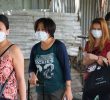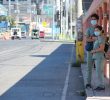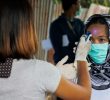
Presidential photo
DAVAO CITY, Philippines – It’s been a week after President Rodrigo Duterte signed into law the “Bayanihan to Heal as One Act” that granted him emergency powers for two months to respond to the coronavirus outbreak, yet there is still little to no action from Malacañang.
Duterte signed the bill on Wednesday following a special session convened by Congress on Monday which lasted until dawn of Tuesday. The Senate version, SB 1418, was adopted as the final version, but deleted provisions including the president’s power to takeover business and making him the sole authority to extend his special powers.
What exactly are the powers given to the President under this act?
The law declares a state of national emergency brought about by the spread of coronavirus (COVID-19), following the declaration of a state of public health emergency.
The Act is based on Article VI, Section 23 (2), of the Constitution, which states that Congress “in times of war or other national emergency” can pass a law authorizing the President “to exercise powers necessary and proper to carry out a declared national policy.”
Budgetary powers
-
The Act grants Duterte to discontinue the appropriations on national programs, to realign and utilize savings to augment the following programs:
-
Department of Health, particularly on the operation budget for government hospitals, primarily those identified for treatment of COVID-19; prevention and control of other infectious disease; emergency preparedness and response; quick response fund
-
Operational budget of the Philippine General Hospital
-
National Disaster Risk Reduction Fund or Calamity Fund
-
Programs of the Department of Labor and Employment, such as the Tulong Panghanapbuhay sa Ating Disadvantaged/Displaced Workers, and COVID-19 Adjustment Measures Program (CAMP)
-
Department of Trade and Industry’s Livelihood Seeding Program and Negosyo Serbisyo Sa Barangay
-
Department of Agriculture’s Rice Farmers Financial Assistance Program
-
Programs under the Department of Social Welfare and Development such as assistance to individuals in crisis situation, distribution of food and non-food items, and livelihood assistance grants
-
Allocations to Local Government Units
-
Quick Response Funds in relevant departments
The Law also grants the following powers:
-
Streamline the accreditation of testing kits and facilitate prompt testing;
-
Speed up the procurement of personal protective equipment for health frontliners, medical supplies and testing kits;
-
Lease properties for use of health workers as quarantine centers, temporary facilities and other critical services;
-
Hire temporary human resources for medical and allied medical staff;
-
A special risk allowance to health workers, directing PhilHealth to shoulder all medical costs of workers exposed to Covid-19;
-
A P100,000 cash support for health workers who contract Covid-19, and P1 million given to family in case of death;
-
Regulate and limit the operation of land, sea and air transport;
-
Liberalize grants for incentives of manufacturing or importation of equipment or supplies needed in dealing with the pandemic;
-
Regulate traffic on roads and bridges;
-
Regulate the distribution of power, fuel, energy, and water
-
Require businesses to prioritize and accept contract for materials and services needed to fight the pandemic;
-
Authorize alternative working arrangements for employees in government, constitutional bodies, and the private sector;
-
Move deadlines and timelines for payment of taxes and filing of documents;
-
Direct all banks and other financial institutions like the Government Service Insurance System, Social Security System, and Pag-ibig Fund to implement a 30-day grace period for loan and credit card payments;
-
Provide a 30-day grace period for the payment of residential rents falling during the enhanced community quarantine;
-
Implement an “expanded and enhanced” Pantawid Pamilya Program;
-
Authority to give 18 million low-income families an emergency cash aid of P5,000 to P8,000;
-
Undertake such other measures “as may be reasonable and necessary” to respond to the COVID-19 pandemic
Critique on powers
In Congress, ten lawmakers voted against passing the Act, including the Makabayan Bloc and one Senator. They point out that such powers are already provided in the Constitution, and opposed giving the President a blanket authority on the budget.
Makabayan also questioned giving Duterte much powers without a comprehensive plan on containing the outbreak.
Another concern was the formation of the task force to implement the government’s National Action Plan (NAP) which is composed of the security forces.
The team is chaired by Defense Secretary Delfin Lorenzana and co-chaired by Interior and Local Government Secretary Eduardo Año. The head of the Armed Forces of the Philippines and Philippine National Police comprise the team.
Designated as implementer is Peace Adviser Carlito Galvez, a former Armed Forces of the Philippines (AFP) Chief of Staff.
Makabayan questioned why the team has no single member coming from the health sector that seem to show “a militarist framework” devoid of a medical perspective.
The coronavirus cases in the country have now risen to 1,400 with 68 deaths as of Sunday, March 29. Twelve of the fatalities are doctors.
Health workers have taken to social media to raise their concerns of lack of PPE and support. While citizens also complained of abuses from authorities on the implementation of the enhanced quarantine in Luzon. (davaotoday.com)










